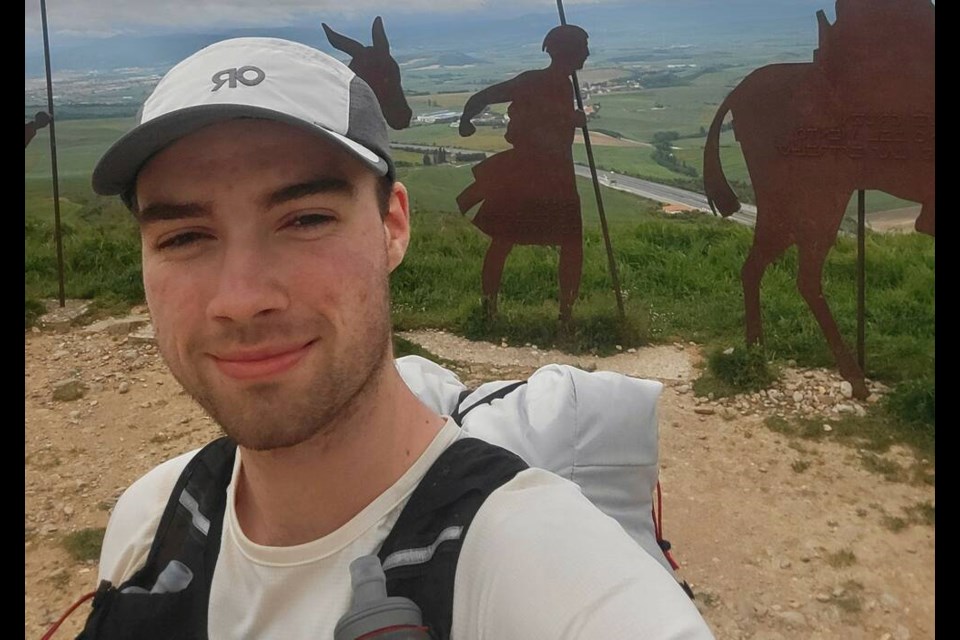Xander Hartwood is the kind of person who casually refers to an ultramarathon as “just a 50k” run.
He’s also the type of guy who likes a challenge.
Which is why after Hartwood hiked the Camino Frances in 2022, he decided he wanted to do it again. But faster.
The 21-year-old from Pender Island recently set the fastest known time on the trail, a route starting in France and crossing northern Spain,
He ran and walked the 784 kilometres in eight days, nine hours and 16 minutes, beating the previous “self-supported” record by nearly a day, according to Fastest Known Time, a website that tracks records on hiking trails around the world.
“Self-supported” means Hartwood took care of all his own food and supplies along the way. On a supported hike, the walker has others provide them with food, simplifying the challenge.
Camino Frances is the most popular trail in a network of pilgrimages leading to the Cathedral of Santiago de Compostela in northwest Spain. Nearly half of the 500,000 people who received a finisher certificate in 2024 for all Camino routes walked the Camino Frances, according to statistics kept by the Pilgrim’s Reception Office in the terminus town.
Hartwood’s first hike, from the southern French town of Saint-Jean-Pied-de-Port to Santiago de Compostela, took 25 days and was probably the best month of his life, he said.
He thrived on the simplicity of his routine: waking early in the morning, packing up his few belongings, walking all day until he reached a hostel, washing his clothes and showering before going to bed, then waking up to do it all over again.
“Doing that all day, every day, for a month at a time, really simplifies life and gives you a lot of time to think about what’s important to you and how you want to live,” Hartwood said.
He learned about the existing fastest-known time by the end of his first hike, when he was walking 45 to 50 kilometres a day, but he didn’t think too seriously about trying to challenge it at first.
When Hartwood returned home from Spain, he started running longer distances and doing back-to-back days of long runs, building on the fitness he’d gained on the Camino. He ran the same routes week after week, challenging himself to shave his time. “I got kind of addicted to seeing that progress.” He ran his first 50k ultramarathon in 2023 and worked his way up to a 100-mile race in February.
Around that time, Hartwood decided he had both the physical fitness and mental grit to tackle the Camino record, so he set to work meticulously researching the trail to determine the right gear to bring, plan where he could stock up on food and decide his camping stops.
On May 21, Hartwood set out from Saint-Jean-Pied-de-Port carrying a lightweight 30-litre pack designed for “fastpacking.”
Inside the pack, he carried a lightweight shelter called a bivy bag, an inflatable sleeping pad, a lightweight synthetic quilt, a pillow, a fleece sweater and leggings, a rain jacket, a small toiletry kit and a small electronics bag.
He knew there would be small towns every five to 10 kilometres along the trail where he could stop for a meal. He planned his snack resupplies in bigger towns, which came roughly every 40 to 90 kilometres. Water sources were plentiful, so he only needed to carry about a litre at a time. At its heaviest with food and water, Hartwood’s bag was about 14 pounds. Hartwood estimates he consumed about 5,000 calories a day.
He walked and ran the trail, saving time by running the flat sections and most downhills. His daily distance ranged from 84 to 93 kilometres, until his penultimate day, when he pushed himself to do 101 kilometres in 19 hours before fighting leg cramps to get 3.5 hours sleep.
On his final day, Hartwood hiked 162 kilometres in 33.5 hours, walking straight through the night. Hartwood knew skipping a night’s sleep would help him gain several hours on the previous record-holder, who did rest on the last night.
“And also I was kind of ready to just be done walking,” he said.
His feet were sore, and walking faster didn’t make the pain much worse. Instead, it shortened the time he had to feel the pain, he said.
Reaching the terminus in Santiago de Compostela on May 29, where a couple of friends had flown in to meet him, was a little anticlimactic, he said.
“I was just so tired at that point. That’s probably another reason why there wasn’t a huge celebration or emotions at the end, is because I was so sleep-deprived and it was 32 degrees,” Hartwood said.
It took about a week for Hartwood to feel normal again, but he’s already looking for his next challenge and has his sights set on a nearly 200-kilometre trail race in Manning Provincial Park.
While those kinds of distances may not appeal to everyone, Hartwood thinks his goal is universal.
“This isn’t a macho manly pursuit, like I want to be better than everyone. I want to be better than myself, and I think everybody can do that,” he said.



